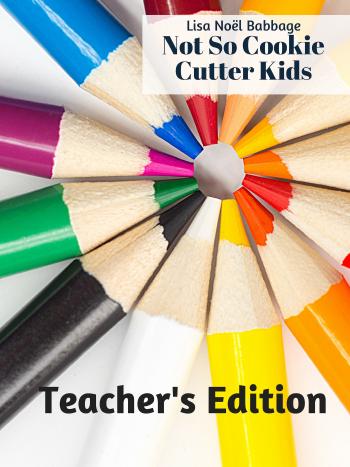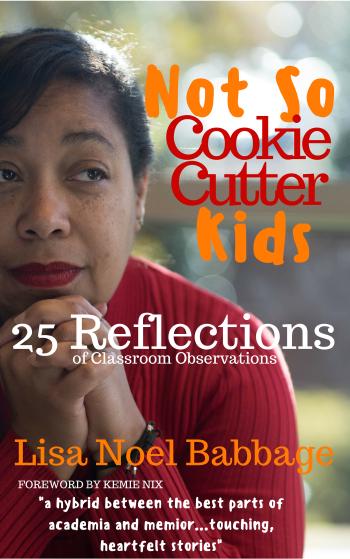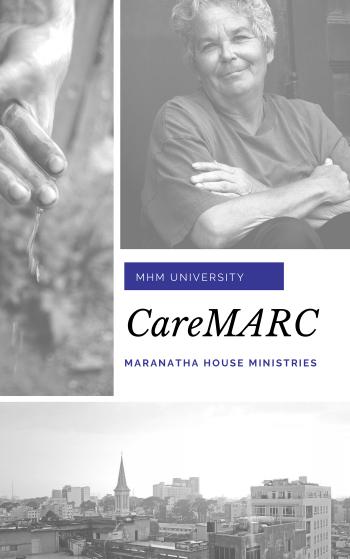Not So Cookie Cutter Kids, Teacher Edition
Academic Memoir & Professional Development workbook Bundle
A bundle combining the groundbreaking work Not So Cookie Butter Kids (Botany Bay, 2018), this teacher’s edition includes a professional development workbook that develops a step by step guide to professional self reflection. Using vignettes from the academic memoir, NSCCK Professional Development Workbook is designed for educators at any level of the organization, from kindergarten to twelfth grade as well as administrators, homeschool educators, parents, coaches, and college professors. Each section walks participants through the practice of engaging their students to promote mastery through the educator’s self reflective practices.
Separated into three distinct sections, the Not So Cookie Cutter Kids Professional Development Workbook address the major concerns from the academic memoir. With professional modeling, resource materials, consumable data sheets, Enabling and Terminal Objectives, each page builds upon the educator’s prior knowledge and pedagogical experience to improve teacher practices and student performance.
Excerpt from How to Use This Guidebook (Copywritten material)
HOW TO USE THIS GUIDEBOOK
The Not So Cookie Cutter Kids (NSCCK) Professional Development Guidebook is a workbook laid out in three sections, each with narratives supported by prompts. The guidebook is primarily for use by classroom teachers in K-12 institutions, however, the narratives and insights can be applied by homeschool families, parents, and coaches. Over 50 years of classroom and district level experience has gone into the making of this guidebook. For use in individual study, book circles, and site or district level professional development, NSCCK Professional Development Guidebook provides educators with the tools to immediately apply reflective practices to their instructional settings.
A teacher is typically the one within the education team who actually interacts face to face with the learner. Whereas an educator may be any person that contributes to the education of a learner, including an administrator, academic chair or coach, or tutor. All of these stakeholders are educators but the actual teacher is the one in the classroom with the students day after day. Throughout this guidebook, the terms educator and teacher are used interchangeably because every member of the education team should improve their practices through self reflection.
With every reflective practice you implement in your classroom, best practices for teaching and learning based on Marzano’s effective teaching strategies’ primary objective of promoting student engagement must be applied. Read the introduction section of this guidebook to become familiar with student engagement at various levels before attempting to quantify reflections which impact student outcomes.
Use discernment when applying reflective practices that are appropriate to the age or grade level of students you encounter. Some reflections are more applicable to Elementary-aged students while other reflections may be more applicable to middle or high school aged students. Understanding which reflections are appropriate to the affected students is a critical part of self reflection on the part of the educator. It is important to remember that self reflection is not punitive. But instead should be an on-going practice that improves not only student engagement but student performance as well. Self reflection is as much a part of data driven instruction as any other information that goes into professional practice, factor, or anecdote.
While using this guidebook, educators will be asked to identify students in their current or past classrooms that are aligned to the specific learner characteristics or topic being discussed in Not So Cookie Cutter Kids: 25 Reflections of Classroom Observations book. A space for small group discussions, journaling, and self monitoring is provided in each section If you struggle with recalling specific students or scenarios that apply to the reflection topic, use the student referenced in the text and hypothesize on how to best service that individual by working through the enabling and terminal objectives.
In each chapter you will find areas for your own reflective practices. As you analyze these reflections you will be asked to arrive at averages for the data you collect. Do not be discouraged by the amount of math this process required. The only calculations you as the educator are responsible for are averages, and classroom teachers calculate averages all day.
Table of Contents
Section I: Understanding Cognitive Development
Response to Intervention
Intelligence Quotient
Retention
Social Promotion
Performance Indicators
Executive Functioning
Culturally Responsive Teaching
Self-Regulated Learning Strategies
Learning Helplessness
Processing Speed
Problem Based Learning
Basic Interpersonal Communication Skills
Understanding Cognitive Development Resources
Bloom’s Taxonomy Matrix
Pedagogy Wheel
Table on Stages of Development
Individuals with Disabilities Education Act (IDEA)
Section II: Understanding Language Development
Theory of Language Acquisition
Processing
Family impact on Language
Low Frustration Tolerance / Low Discomfort Tolerance
Cognitive Academic Language
Looping, Acceleration, and Remediation
Self-Regulated Learning Strategies
Socratic Method and Debate
English Speakers of Other Languages
##Section II Continued
Understanding Language Development Resources
Bloom’s Taxonomy Verb table
Speaking, Writing, Reading, Listening Language Skills table
Using Renzulli Scales in the Classroom Diagram
Schoolwide Enrichment Model
Section III: Understanding Trauma and Family Change
Child Abuse
Death and Suicide
Trauma Informed Care
Physical Health
Wallflower Syndrome
Mental Health
Dissociation and Adultification
Stages of Grief
Puberty and Attention Deficit
Bullying, Prejudice, and Peer Pressure
Self Esteem and Insecurity
Blended Families and Divorce
Also Check Out:
Not So Cookie Cutter Kids
Academic Memoir
Not So Cookie Cutter Kids chronicles Lisa Noël Babbage’s the last year of public school teaching using self reflections as a professional practice by which she identified strategies for coping with twenty-five student characteristics. For teachers, coaches, parents, and school administrators, Not So Cookie Cutter Kids is a hybrid, a new genre that is part academic and part biographical. This academic memoir argues the basis for statistically infused self reflection, when used with in the Teacher’s Edition Bundle, to improve student performance and reduce teacher burnout.
More →


